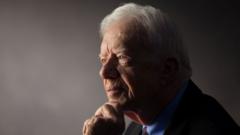In a remarkable examination of the Biden administration's current obstacles compared to those faced by former President Jimmy Carter, it becomes clear that many core challenges have circled back after decades. With 44 years between Carter's departure from office and his recent passing, parallels are drawn between the crises of the late 1970s and today's pressing issues. While the players have changed, the landscape of challenges remains ever-relevant.
During Carter's presidency, a profound crisis of confidence gripped the nation, triggered by economic instability and international tensions. The United States wrestled with inflation and a challenging foreign policy balance, particularly evident during the Iran hostage crisis where American citizens were held captive, reflecting a painful vulnerability that ultimately contributed to a significant electoral defeat for Carter in 1980.
President Biden faced his own version of this reality with the chaotic withdrawal from Afghanistan in 2021, a move reminiscent of the American shortcomings during Carter's presidency. The ongoing conflict in Gaza serves as a reminder of the limitations of American influence in the region, echoing Carter's incomplete achievements amid a backdrop of territorial ambitions from global powers such as Russia.
Both leaders confronted rising tensions related to China and the persistent issues of climate change and energy. Carter's attempts to address environmental policies resonate in Biden's recent legislative efforts, which draw from the foundational approaches laid by Carter during an era of crisis.
Public trust, another crucial theme across both presidencies, illustrates the evolution of American sentiments towards government. Carter faced disillusionment in the wake of Watergate, a sentiment that has persisted and deepened, becoming particularly acute during the Trump presidency. Biden’s struggle to restore confidence in government resonates with Carter’s own experiences where faith in leadership drastically dipped.
Comparisons between Biden and Carter persist, particularly as critics and supporters alike reflect on effective leadership strategies. Unlike Carter, who devoted his life post-presidency to humanitarian causes and earned a Nobel Peace Prize, Biden’s post-White House future remains uncertain with political vendettas looming large.
The lasting legacy of Jimmy Carter captures a distinct period in American history that echoes today, highlighting how deeply interconnected international strife, economic challenges, and public perception shape the landscape for leaders in the United States. As President Biden grapples with these familiar issues, the lessons drawn from Carter’s experiences may serve as a vital guide amid ongoing turbulence at home and abroad.














